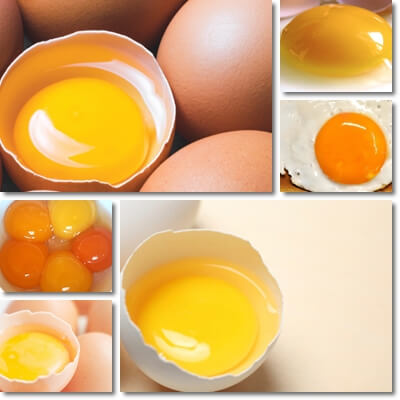Is it better to eat egg whites or egg yolks? There’s a long standing debate on whether egg whites or egg yolks are healthier, with most people leaning towards the egg white being better for you than the egg yolk. It’s true that egg whites have no cholesterol, and they’re high-protein, low-calorie and very low-fat. But egg yolks are just as good despite the fat and the cholesterol and the calories because they carry most of the nutritional value of the egg. And fat and cholesterol aren’t bad for you either.
Which is healthier: egg white or egg yolk?
Which part of the egg is healthier: the egg white or the egg yolk? Egg white and egg yolks have different nutritional profiles that make them each suitable for particular nutritional requirements. For example, you eat egg whites, not egg yolks or whole eggs, if you’re looking to lose lots of weight and need to cut back on your calories. But it’s the egg yolk that is good for you if you have anemia and want to combat symptoms such as tiredness and fatigue. Different nutritional requirements will engender the need to make different dietary choices.

The secret to eggs being good for you is to eat them reasonably, in accordance with your individual nutritional requirements, and choose to cook them in a way that is healthy. But if you want to eat one part of the egg or the other, or need to for various reasons, then that’s ok too. Learn to choose which part of the egg is healthier and better for you depending on the circumstances.
Which part of the egg for weight loss?
Egg white or egg yolk for weight loss? If you have quite a lot of weight to lose, then egg white is definitely better than egg yolk. Egg whites have only 52-55 kilocalories per 100 g (roughly the egg whites) vs egg yolks which have 322-328 kilocalories per 100 g. Egg whites are also almost fat free (with only trace amounts of fat), whereas egg yolks contain most of the fat in eggs.
Protein is also important for losing weight because it helps build muscle which both helps burn more calories, and contributes to a leaner appearance and a more toned body. And egg whites have more than half of the entire protein content of eggs, as well as very few carbs. On average, egg white are a little over 10% protein per weight.

Which part of the egg for iron deficiency?
If you have iron deficiency, then egg yolk is better for you than egg white. Most of the iron content of eggs resides in the yolk. How much iron in egg white vs egg yolk? There are 2.73 milligrams (mg) of iron per 100 grams (g) of egg yolk, and only 0.08 mg of iron per 100 g of egg white. Whole eggs have 1.75 mg of iron per 100 g (a little less than 2 medium sized eggs).
Which part of the egg for vitamin B12 deficiency?
To get more vitamin B12 in your diet, choose egg yolks over egg whites. There are 1.95 micrograms (mcg) of vitamin B12 in every 100 grams (g) of egg yolk, and only 0.09 mcg of vitamin B12 in the same amount of egg white. The average adult requires 2.4 micrograms (mcg) of vitamin B12 a day. A serving of 100 g of egg yolk gets you over 80% of your daily vitamin B12 requirements, while whole eggs around 45%.
Which part of the egg for better immunity?
Which is better for immunity between egg white and egg yolk? Both parts of the egg are good for the immune system. Egg whites and yolks are both high in protein and protein is needed for the immune system response – immune system cells are protein-based so you need proteins to have an effective immune system response. Egg yolks also have micronutrients which further support the immune system such as vitamin A, vitamin D and zinc.
Which part of the egg for anemia?
The egg yolk is definitely the better choice for anemia since it contains almost all the iron and vitamin B12 content of the egg. Whole eggs are second best, while egg whites are not particularly helpful for anemia caused by iron or vitamin B12 deficiency because they are very low in both nutrients.
Which part of the egg for the brain?
Fats are essential for normal brain development and to support cognitive functions such as memory, learning and thinking. In this respect, egg yolks are better because they are generous sources of fat, unsaturated and saturated, both good for feeding and building the brain. Egg yolks also contain Omega-3 which is particularly good for the brain. Versus the yolk, the egg white has little to no fat to feed the brain.
Which part of the egg to build muscle?
You can technically eat both egg whites and egg yolks, separately or as whole eggs, if you are looking to build muscle. Both the egg white and the egg yolk are good sources of protein and contain all essential amino acids to help grow muscle and repair damaged muscle fibers.
On average, egg whites have 10.9 grams protein per 100 g, while egg yolks have 15.8 grams of protein for the same amount. In whole eggs, the egg white accounts for a little more than half of the entire protein content. However, egg yolks should be consumed reasonably because they are higher in calories.
Which part of the egg for pregnancy?
In pregnancy, it’s better to eat whole eggs than just egg whites or egg yolks, provided the pregnant woman is healthy and there are no dietary contraindications. The egg white provides protein for satiation, immune system support, connective tissue health and cell signaling. The egg yolk provides both protein and important micronutrients that are good for the development of the baby during pregnancy.
Egg yolks contain fats to help build the brain and nervous system of the baby, especially Omega-3 fatty acids. The yolk also has vitamin B9 (146 micrograms/100 g of yolk out of 400 mcg daily requirements) which prevents defects of the brain, spine and spinal cord in the baby during pregnancy. It also has all the vitamin B12 in the egg which helps combat fatigue in pregnancy and supports the expanding circulatory system of the mother.
Which part of the egg for protein?
Both egg white and egg yolk are high in protein and contain all essential amino acids as well as conditionally essential amino acids, making them equally good sources of protein. The choice between the egg white or the egg yolk should be made based off of other nutritional aspects (e.g. the egg white is low in calories, while the egg yolk is high in calories, but the latter is more nutritious because it contains most of the vitamins and minerals in the egg).
Which part of the egg for the nervous system?
For nervous system health, both egg yolks and egg whites are good. Both have protein which supports cell signaling between neurotransmitters connecting the nervous system and the rest of the body. But the yolk is even better because it has vitamin Omega-3, cholesterol and other fats needed for building cells, including nerve cells.
Vitamin B12 and cholesterol in egg yolk are good for the nervous system because they help build the protective myelin sheath surrounding the tail of nerve cells, insulating them. Loss of the myelin sheath has been observed in degenerative diseases of the nervous system such as multiple sclerosis.
Which part of the egg for memory?
For better memory, choose either egg yolks, or whole eggs. Egg yolk is good for memory because of its high content of B vitamins, especially vitamins E and B12, and fats, both unsaturated and saturated. The brain is made of fats and nourished by fats so getting them in your diet in sufficient amounts, especially from clean foods such as eggs, is vital for good memory.
Which part of the egg for diabetes?
Eggs are not bad for diabetics, but rather the amounts they are consumed in. Diabetes is a metabolic disease with complications such as high blood pressure, high cholesterol and excess weight. Substituting unhealthy food options for eggs, and consuming them reasonably, can provide good nutrition for diabetics and even help improve their health. Egg whites are a little better because they are low in calories and high in protein, provide satiety and can help with weight loss, if needed.
Which part of the egg for high cholesterol?
Cholesterol from eggs is not what causes high blood cholesterol. Excess fat and simple carbs and eating too much leads to weight gain and subsequently also high cholesterol. Switching to a clean diet and losing weight can help improve cholesterol numbers and profile. While egg whites are better at first, once cholesterol levels are more balanced, egg yolks can also be consumed safely, with benefits for health.
Which part of the egg for the liver?
A healthy liver can process fats without any issues meaning you can eat both egg whites and egg yolks, either as whole eggs or separately. But when you have liver problems you usually have to limit your intake of fats to help the liver by making its life a little easier. In this instance, egg whites are usually the better choice.
Which part of the egg for high blood pressure?
Neither egg white nor egg yolks cause high blood pressure. A high salt intake, a low potassium and magnesium intake, eating processed foods, fatty foods and eating too much, associated weight gain and cardiovascular disease cause high blood pressure. Lowering salt intake, increasing potassium and magnesium, and eating less, but cleaner and more nutritious, including clean foods such as egg whites and egg yolks, is good for blood pressure.
Which part of the egg for fertility?
Egg yolks are better for fertility than egg whites. Egg yolks have the nutrition to boost fertility, such as good amounts of zinc, vitamin E, vitamin D, cholesterol and other fats. Zinc in egg yolks is good for both male and female fertility, while vitamin D is good for for female fertility in particular – research has identified receptors for vitamin D in the uterus and ovaries. In addition to being one of the few foods that naturally contain vitamin D, egg yolks also have cholesterol which the body needs to process vitamin D.
